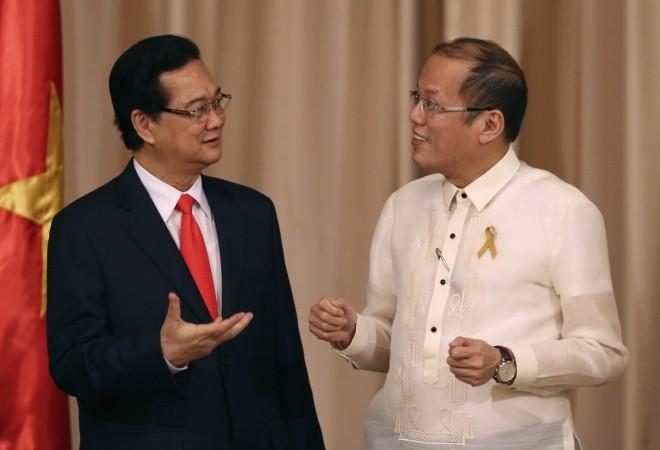
Vietnamese Prime Minister Nguyen Tan Dung said his government was considering various "defence options" against China, including legal action, following the deployment of a Chinese oil rig to waters in the South China Sea that Hanoi also claims.
Dung's comments, given in a written response to questions from Reuters, are the first time he has suggested Vietnam would take legal measures, a threat likely to infuriate Beijing.
"Vietnam is considering various defence options, including legal actions in accordance with international law," Dung said in an email sent late on Wednesday, while on a visit to Manila. He did not elaborate on the other options being considered.
"I wish to underscore that Vietnam will resolutely defend its sovereignty and legitimate interests because territorial sovereignty, including sovereignty of its maritime zones and islands, is sacred," he said.
In late March, the Philippines formally submitted a case to an arbitration tribunal in The Hague, challenging China's claims to the South China Sea. It was the first time Beijing has been subjected to international legal scrutiny over the waters.
Beijing has refused to participate in the case and warned Manila that its submission would seriously damage ties.
Anti-Chinese violence flared in Vietnam last week after a $1 billion deepwater rig owned by China's state-run CNOOC oil company was parked 240 km (150 miles) off the coast of Vietnam.
Hanoi says the rig is in its 200-nautical mile exclusive economic zone and on its continental shelf. China has said the rig was operating completely within its waters.
The move was the latest in a series of confrontations between China and some of its neighbours. Washington has responded with sharpened rhetoric towards Beijing, describing a pattern of "provocative" actions by China.
U.S. Secretary of State John Kerry discussed the situation with Vietnamese Deputy Prime Minister and Foreign Minister Pham Binh Minh on Wednesday, the two governments said. Kerry also invited Minh to visit Washington, U.S. State Department spokeswoman Jen Psaki said.
Dung, in some of his strongest comments yet on the breakdown in ties with Beijing, said that while Vietnam had sought to use dialogue to settle the situation the response from China had been an increase in force and intimidation.
"There is a vast gap between the words and deeds of China," he said.
Both sides have traded accusations over who was to blame for a series of collisions between Vietnamese and Chinese vessels in waters near the oil rig earlier this month.
China claims about 90 percent of the South China Sea, displaying its reach on official maps with a so-called nine-dash line that stretches deep into the maritime heart of Southeast Asia. The Philippines, Vietnam, Malaysia, Brunei and Taiwan also have claims to parts of the potentially energy-rich waters.
HANOI WEIGHS OPTIONS
Vietnamese officials have been following Manila's arbitration case closely, including speaking to foreign legal academics about their options and obtaining briefings from the Philippines, according to diplomats and legal sources.
Legal sources said Vietnam has not yet contacted the Washington-based legal team used by the Philippines.
Diplomatic sources in Vietnam have previously told Reuters that China put pressure on Hanoi over joining the Philippine case. Lawyers say the Permanent Court of Arbitration has discretionary powers to allow other states to join the action.
Manila is seeking a ruling to confirm its right to exploit the waters in its exclusive economic zone as allowed under the U.N. Convention on the Law of the Sea (UNCLOS).
A ruling against China could prompt other claimants to challenge Beijing, experts have said, although Manila has said it does not expect the tribunal to reach a decision before the end of 2015.
Any ruling would effectively be unenforceable because there is no body under UNCLOS to police such decisions, legal experts have said.
But diplomats said the case was the focus of growing interest across East Asia and beyond, given China's assertiveness in both the South and East China Seas.
CHINA "BROUGHT US TOGETHER"
To try to keep up the pressure on Beijing, diplomats in the region said Vietnam might host a meeting with Philippine and Malaysian officials at the end of the month to discuss how to respond to China, underscoring the nascent coordination among the three countries. Earlier meetings in February and March had discussed the Philippine legal case.
A senior Malaysian diplomatic source told Reuters last week that China's assertiveness had given momentum to the three-way talks and "brought us together", but he played down the discussions as little more than "chit chat" at this stage.
Malaysia had no intention of filing a legal case against China, the source added.
Indeed, Vietnam and the Philippines have been the most vocal.
On Wednesday, Dung said Vietnam and the Philippines were determined to oppose Chinese infringement of their territorial waters, calling on the world to condemn China's actions in a rare public show of unity against Beijing.
Experts said the two had little choice given that the Association of South East Asian Nations (ASEAN), of which they are members, had shown little stomach for a fight with China. Some ASEAN countries have close political and economic ties to Beijing.
"It's unprecedented for Vietnam to join a U.S. ally and appeal directly for international support," said Carl Thayer, an expert on the region at the Australian Defence Force Academy in Canberra.
"It is an admission that ASEAN is not going to go to the mat on this one, so Vietnam has got to play some of the only options it has got left."
The spat between Vietnam and China is the worst breakdown in ties between the two Communist states since a brief but bloody border war in 1979.

















